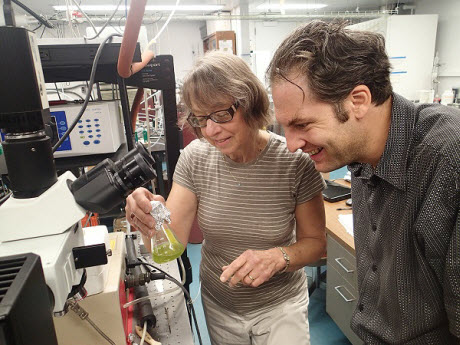 Stony Brook University professors Josephine Aller and Daniel Knopf in front of microscope ice nucleation apparatus and phytoplankton culture.Photo courtesy of Stony Brook UniversityScientists believe that the thin film on the ocean’s surface, which is involved in the formation of sea spray, holds many mysteries that impact our atmosphere and world. A team of Stony Brook University and international researchers may have discovered one key role of this thin layer. They found that biogenic materials in the layer may affect ice cloud formation and thus climate on a global scale, particularly when other known ice forming particles such as mineral dust are scarce or absent. Their findings are detailed in a paper published in Nature.
Stony Brook University professors Josephine Aller and Daniel Knopf in front of microscope ice nucleation apparatus and phytoplankton culture.Photo courtesy of Stony Brook UniversityScientists believe that the thin film on the ocean’s surface, which is involved in the formation of sea spray, holds many mysteries that impact our atmosphere and world. A team of Stony Brook University and international researchers may have discovered one key role of this thin layer. They found that biogenic materials in the layer may affect ice cloud formation and thus climate on a global scale, particularly when other known ice forming particles such as mineral dust are scarce or absent. Their findings are detailed in a paper published in Nature.
Sea spray aerosol, containing salt and various organic compounds produced by phytoplankton and other microorganisms in surface ocean waters, is emitted by the bursting of bubbles formed by breaking waves and is one of the major sources of particles in the atmosphere. The research groups of Daniel A. Knopf, PhD, in the Institute for Terrestrial and Planetary Atmospheres in Stony Brook’s School of Marine and Atmospheric Sciences (SoMAS), and Josephine Aller, PhD, of SoMAS, are working to unravel the complicated relationship between microorganisms in ocean surface waters, organic compounds in sea spray, and ice cloud formation, which in turn affects precipitation and climate.
“How natural aerosol particles affect the radiative properties of clouds is poorly understood and is one of the largest uncertainties in the prediction of future climate changes,” said Professor Knopf. “But our international collaborative brought together the scientific expertise to show that the sea surface microlayer contains ice nucleating organic material released by phytoplankton.”
In the paper, “A marine biogenic source of atmospheric ice-nucleating particles,” the research team studied the source of marine ice nucleating particles through the use of field instruments during several oceanic cruises, laboratory ice nucleation measurements, and state-of-the-art synchrotron X-ray single particle analysis, using facilities at the Lawrence Berkeley National Laboratory’s Advanced Light Source.
Professors Knopf and Aller with their students showed that dissolved organic material released by a common ocean phytoplankton species grown in the laboratory could form ice under temperatures and relative humidity typical of the atmosphere. The Stony Brook team further demonstrated that field collected surface ocean microlayer film material capable of ice nucleation is physicochemically similar to the organic material released by the laboratory culture.
These findings, in combination with ice nucleation experiments using the Arctic microlayer samples, led the international team to conclude that biogenic ice nucleating particles present in material released by phytoplankton are a good candidate for the source of activity observed in the sampled microlayers. It is known that sea spray aerosol is often associated with phytoplankton material. This suggests that some fraction of sea spray aerosol particles will be capable of forming ice in the atmosphere.
Armed with these data, the international team developed a global model incorporating sea spray aerosol emissions and ice formation efficiencies measured in the laboratory to unambiguously link phytoplankton with particles that form ice in the atmosphere.
“The application of this model to assess the transport of marine ice nucleating particles to cold atmospheric regions allowed us to infer that marine ice nucleating particles can be compared to dust sources in large parts of the Southern Ocean, the North Atlantic and the North Pacific,” explained Professor Knopf. “This leads us to conclude that oceans are potentially a major source of naturally occurring ice forming particles in the atmosphere.”
International research team members involved in the study come from 11 universities or institutions in the United States, Canada and Europe.
The research is supported in part by the National Science Foundation and the U.S. Department of Energy.














